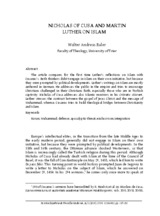Mostrar el registro sencillo del ítem
Nicholas of Cusa and Martin Luther on Islam
| dc.contributor.author | Euler, Walter Andreas | |
| dc.date.accessioned | 2022-08-03T09:54:52Z | |
| dc.date.available | 2022-08-03T09:54:52Z | |
| dc.date.issued | 2019 | |
| dc.identifier.issn | 2530-7878 | |
| dc.identifier.issn | 1133-0902 | |
| dc.identifier.uri | http://hdl.handle.net/10396/23779 | |
| dc.description.abstract | The article compares for the first time Luther‘s reflections on Islam with Cusanus‘s. Both thinkers didn‘t engage in Islam on their own initiative, but because they were prompted by political developments. Luther‘s writings on Islam are mostly authored in German. He addresses the public in the empire and tries to encourage Christians challenged in their Christians faith, especially those who are in Turkish captivity. Nicholas of Cusa addresses also Islamic receivers in his Cribratio Alkorani. Luther stresses the contrast between the gospel of Jesus Christ and the message of Muhammad, whereas Cusanus tries to build theological bridges between Christianity and Islam. | es_ES |
| dc.format.mimetype | application/pdf | es_ES |
| dc.language.iso | eng | es_ES |
| dc.publisher | UCOPress | es_ES |
| dc.rights | https://creativecommons.org/licenses/by-nc-nd/4.0/ | es_ES |
| dc.source | Revista Española de Filosofía Medieval 26, 137-151 (2019) | es_ES |
| dc.subject | Koran | es_ES |
| dc.subject | Muhammad | es_ES |
| dc.subject | Defense | es_ES |
| dc.subject | Koran; Muhammad; defense; apocalyptic threat; exclusivism; integration | es_ES |
| dc.subject | Apocalyptic threat | es_ES |
| dc.subject | Exclusivism; integration | es_ES |
| dc.title | Nicholas of Cusa and Martin Luther on Islam | es_ES |
| dc.type | info:eu-repo/semantics/article | es_ES |
| dc.relation.publisherversion | https://www.uco.es/ucopress/ojs/index.php/refime/index | es_ES |
| dc.rights.accessRights | info:eu-repo/semantics/openAccess | es_ES |

